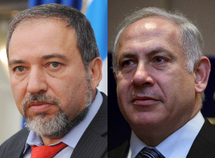Deadlock in peace efforts testing Israeli coalition
Steve Weizman
JERUSALEM, Steve Weizman- The deadlock in Middle East peace efforts is placing strain on the ruling coalition of Prime Minister Benjamin Netanyahu, with ministers of the doveish Labour party threatening to jump ship.
"This government today is coming to a standstill," Minorities Minister Avishay Braverman told reporters as he arrived Sunday at the weekly cabinet meeting.

"They must make a clear decision," he said. "If there is direct negotiation (with the Palestinians), we are in the government; if not we are pulling out of the government."
Direct talks between Israel and the Palestinians, the first for nearly two years, began on September 2 but stalled just three weeks later when a 10-month Israeli settlement-building freeze expired and Netanyahu refused to renew it.
Netanyahu said Sunday that he was prepared for an immediate resumption of face-to-face talks with Palestinian president Mahmud Abbas "until white smoke emerges," a statement from his office said.
If Abbas were to accept the invitation, the statement quoted Netanyahu as saying, they could discuss all key aspects of the dispute and see if there were prospects for progress.
"We shall very soon know if we shall be able to reach an agreement," Netanyahu said.
Abbas says there will be no more talks while settlement expansion continues. He said at the weekend that on-off talks with Israel had produced nothing and he appealed to the peacemaking Quartet of the United Nations, the United States, Russia and the European Union, to lead a search for fresh ideas.
"We demand that the Middle East Quartet and the various UN bodies, headed by the Security Council, draft a peace plan which conforms with international law, instead of keeping up negotiations which do not solve the problem," he said in an address broadcast on Palestinian TV on Friday.
Haaretz daily on Sunday quoted an unnamed Israeli official as saying that a US counterpart told him that Washington was deeply disappointed with Israeli defence minister and Labour party leader Ehud Barak for failing to deliver on promises that he could win government approval for a fresh settlement freeze.
His Labour Party colleagues, including Braverman, are clearly frustrated.
"Mr Barak, the chairman of my party, to my greatest sorrow had a strategy that didn't work," Braverman said. "Unfortunately Netanyahu is not moving forward and the price is being paid by our country... and the Labour party which is losing the confidence of the public."
In the 2009 general election, Labour, which dominated Israeli politics and government for decades following the establishment of the state in 1948, limped home in fourth place, behind the opposition Kadima party, Netanyahu's Likud and the ultranationalist Yisrael Beitenu of Foreign Minister Avigdor Lieberman.
Social Affairs Minister Isaac Hertzog, of Labour, said Netanyahu must find a way to revive peace talks in order to keep his coalition intact.
"I think that the prime minister needs to understand that the stability of his government is in danger," he told reporters. "We all understand the significance of a situation where nothing is being done on the diplomatic front, where there is a diplomatic seizure."
Hertzog said he was leading the efforts to convene a party congress which would not only debate the peace process but vote on whether to bring forward party leadership elections.
"It should be within the next few weeks," he said. "It should take dramatic and significant decisions and should move toward renewing and saving the party.
---------------------------------------------------------------------------------